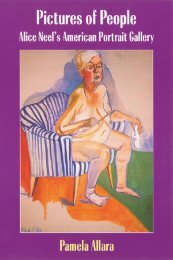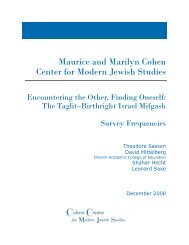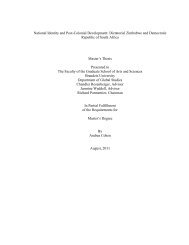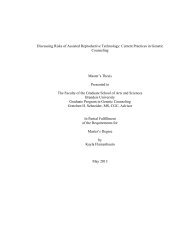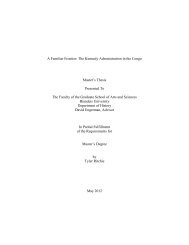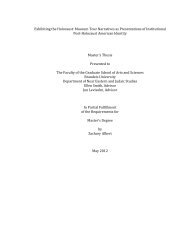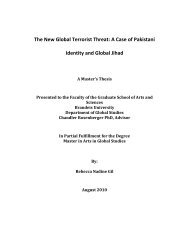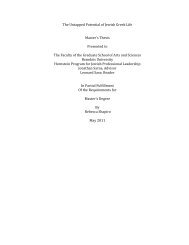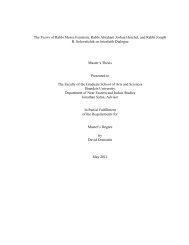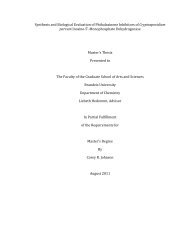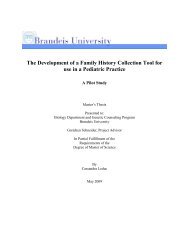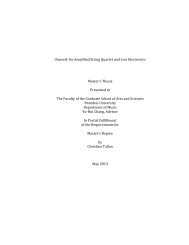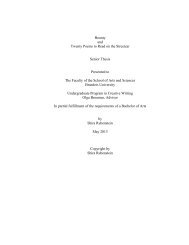Ezra Taft Benson and the State of Israel - Brandeis Institutional ...
Ezra Taft Benson and the State of Israel - Brandeis Institutional ...
Ezra Taft Benson and the State of Israel - Brandeis Institutional ...
- No tags were found...
Create successful ePaper yourself
Turn your PDF publications into a flip-book with our unique Google optimized e-Paper software.
visits to promote Public Law 480. Despite his ra<strong>the</strong>r secular duty as a representative <strong>of</strong>United <strong>State</strong>s Agricultural interests, his comments on <strong>Israel</strong> tend toward <strong>the</strong> religious,differing somewhat from his comments on <strong>the</strong> o<strong>the</strong>r countries he toured. In fact,although <strong>Israel</strong>i society <strong>of</strong> <strong>the</strong> 1950s focused on mostly nonreligious aspects <strong>of</strong> Jewishidentity, <strong>Benson</strong> consistently drew attention to <strong>the</strong> religious aspects <strong>of</strong> both <strong>Israel</strong>'sexistence, <strong>and</strong> its leadership. Indeed, Mart explains that it was very clear that “modern<strong>Israel</strong> bore little relation to <strong>the</strong> biblical Jewish <strong>the</strong>ocracy,” 163 <strong>and</strong> that <strong>the</strong> religious tie to<strong>the</strong> Jewish <strong>State</strong> was <strong>of</strong>ten more evident in American Christian culture than in <strong>Israel</strong>itself. This inclination was certainly true for Secretary <strong>Benson</strong>. Many <strong>of</strong> <strong>Benson</strong>'sstatements return to <strong>the</strong> notion <strong>of</strong> <strong>the</strong> “miraculous drama” 164 <strong>of</strong> <strong>Israel</strong>'s formation. And<strong>Benson</strong> was quick to point out that even <strong>the</strong> early leaders, seen by many as “thoroughlymodern 'European intellectuals <strong>and</strong> idealists,'” 165 held religious feelings about <strong>the</strong>irefforts to build a state for <strong>the</strong>ir people. In his 1976 message, <strong>Benson</strong> recounts a visit withMoshe Dayan during his 1960 trip to <strong>Israel</strong>, during which Dayan (also former Secretary<strong>of</strong> Agriculture) confided in <strong>Benson</strong>, “I'm not what people would call a spiritual man, butno one will ever convince me that <strong>the</strong>re wasn't a higher power with us as we met <strong>the</strong>Egyptians down on <strong>the</strong> Sinai.” 166 Then <strong>Benson</strong> tells about a later visit with David BenGurion, in 1964, with <strong>Benson</strong> this time acting as Apostle <strong>of</strong> <strong>the</strong> Church. <strong>Benson</strong> visitedBen Gurion in his Tel Aviv apartment, <strong>and</strong> at one point during <strong>the</strong> evening, he asked163164165166Mart, “Christianization <strong>of</strong> <strong>Israel</strong> <strong>and</strong> Jews,” 115.<strong>Benson</strong>, Sake Conference Address, 7Mart, “Christianization <strong>of</strong> <strong>Israel</strong> <strong>and</strong> Jews,” 116.<strong>Benson</strong>, “Message to Judah,” 2.53



